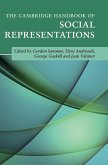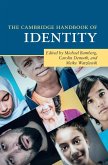The Cambridge Handbook of the Psychology of Prejudice
Herausgeber: Sibley, Chris G.; Barlow, Fiona Kate
The Cambridge Handbook of the Psychology of Prejudice
Herausgeber: Sibley, Chris G.; Barlow, Fiona Kate
- Gebundenes Buch
- Merkliste
- Auf die Merkliste
- Bewerten Bewerten
- Teilen
- Produkt teilen
- Produkterinnerung
- Produkterinnerung
This Handbook provides a comprehensive examination of the psychology of prejudice, from its roots through to its manifestations and consequences.
Andere Kunden interessierten sich auch für
![The Cambridge Handbook of Political Psychology The Cambridge Handbook of Political Psychology]() The Cambridge Handbook of Political Psychology191,99 €
The Cambridge Handbook of Political Psychology191,99 €![The Cambridge Handbook of the Learning Sciences The Cambridge Handbook of the Learning Sciences]() The Cambridge Handbook of the Learning Sciences191,99 €
The Cambridge Handbook of the Learning Sciences191,99 €![The Cambridge Handbook of Computing Education Research The Cambridge Handbook of Computing Education Research]() The Cambridge Handbook of Computing Education Research181,99 €
The Cambridge Handbook of Computing Education Research181,99 €![The Cambridge Handbook of Social Representations The Cambridge Handbook of Social Representations]() The Cambridge Handbook of Social Representations180,99 €
The Cambridge Handbook of Social Representations180,99 €![The Cambridge Handbook of the Intellectual History of Psychology The Cambridge Handbook of the Intellectual History of Psychology]() The Cambridge Handbook of the Intellectual History of Psychology182,99 €
The Cambridge Handbook of the Intellectual History of Psychology182,99 €![The Cambridge Handbook of Identity The Cambridge Handbook of Identity]() The Cambridge Handbook of Identity191,99 €
The Cambridge Handbook of Identity191,99 €![The Cambridge Handbook of Group Interaction Analysis The Cambridge Handbook of Group Interaction Analysis]() The Cambridge Handbook of Group Interaction Analysis178,99 €
The Cambridge Handbook of Group Interaction Analysis178,99 €-
-
-
This Handbook provides a comprehensive examination of the psychology of prejudice, from its roots through to its manifestations and consequences.
Hinweis: Dieser Artikel kann nur an eine deutsche Lieferadresse ausgeliefert werden.
Hinweis: Dieser Artikel kann nur an eine deutsche Lieferadresse ausgeliefert werden.
Produktdetails
- Produktdetails
- Verlag: Cambridge University Press
- Seitenzahl: 688
- Erscheinungstermin: 18. Juli 2017
- Englisch
- Abmessung: 250mm x 175mm x 41mm
- Gewicht: 1347g
- ISBN-13: 9781107098336
- ISBN-10: 1107098335
- Artikelnr.: 45328405
- Herstellerkennzeichnung
- Libri GmbH
- Europaallee 1
- 36244 Bad Hersfeld
- gpsr@libri.de
- Verlag: Cambridge University Press
- Seitenzahl: 688
- Erscheinungstermin: 18. Juli 2017
- Englisch
- Abmessung: 250mm x 175mm x 41mm
- Gewicht: 1347g
- ISBN-13: 9781107098336
- ISBN-10: 1107098335
- Artikelnr.: 45328405
- Herstellerkennzeichnung
- Libri GmbH
- Europaallee 1
- 36244 Bad Hersfeld
- gpsr@libri.de
Part I. General Theoretical Perspectives: 1. An introduction to the
psychology of prejudice Chris G. Sibley and Fiona Kate Barlow; 2.
Evolutionary approaches to stereotyping and prejudice Oliver Sng, Keelah E.
G. Williams and Steven L. Neuberg; 3. From prejudice to social change: a
social identity perspective Katherine J. Reynolds, Emina Subasic, Luisa
Batalha and Ben Jones; 4. Ingroup projection as a challenge of diversity:
consensus about and complexity of superordinate categories Michael Wenzel,
Sven Waldzus and Melanie C. Steffens; 5. Intergroup discrimination: ingroup
love or outgroup hate? Marilynn B. Brewer; 6. Intergroup emotions theory:
prejudice and differentiated emotional reactions toward outgroups Angela T.
Maitner, Eliot R. Smith and Diane M. Mackie; 7. Intergroup threats Walter
G. Stephan and Cookie White Stephan; 8. Social dominance theory:
explorations in the psychology of oppression Jim Sidanius, Sarah Cotterill,
Jennifer Sheehy-Skeffington, Nour Kteily and Héctor Carvacho; 9. The dual
process motivational model of ideology and prejudice John Duckitt and Chris
G. Sibley; 10. Is prejudice heritable? Evidence from twin studies Fiona
Kate Barlow, James M. Sherlock and Brendan P. Zietsch; Part II. Prejudice
in Specific Domains: 11. Understanding the nature, measurement, and utility
of implicit intergroup biases Kumar Yogeeswaran, Thierry Devos and Kyle
Nash; 12. Aversive racism and contemporary bias John F. Dovidio, Samuel L.
Gaertner and Adam R. Pearson; 13. Ambivalent sexism in the twenty-first
century Rachel A. Connor, Peter Glick and Susan T. Fiske; 14. Sexism in
intimate contexts: how romantic relationships help explain the origins,
functions and consequences of sexist attitudes Matthew D. Hammond and
Nickola C. Overall; 15. Religion and prejudice Ben K. L. Ng and Will M.
Gervais; 16. Sexual prejudice: advances in conceptual and empirical models
V. Paul Poteat and Michelle Birkett; 17. Weight bias: prejudice and
discrimination towards overweight and obese people Phillippa C. Diedrichs
and Rebecca Puhl; 18. Prejudice against immigrants in multicultural
societies Colleen Ward, Agnes Szabo and Jaimee Stuart; 19. Generalized
prejudice: old wisdom and new perspectives Robin Bergh and Nazar Akrami;
Part III. Prejudice Reduction and Analysis in Applied Contexts: 20. Recent
developments in intergroup contact research: affective processes, group
status, and contact valence Linda R. Tropp, Agostino Mazziotta and Stephen
C. Wright; 21. From prejudice reduction to collective action: two
psychological models of social change (and how to reconcile them) John
Dixon, Kevin Durrheim, Clifford Stevenson and Huseyin Cakal; 22.
Self-regulation strategies for combating prejudice Mason D. Burns, Laura
Ruth M. Parker and Margo J. Monteith; 23. Antecedents and consequences of
evaluative concerns experienced during intergroup interaction: when and how
does group status matter? Jacquie D. Vorauer and Matthew Quesnel; 24.
Stereotypicality biases and the criminal justice system Danny Osborne, Paul
G. Davies and Shirley Hutchinson; 25. Prejudice, stigma, bias,
discrimination and health Yin Paradies, João Luiz Bastos and Naomi Priest;
26. Development of delegitimization and animosity in the context of
intractable conflict Daniel Bar-Tal and Talia Avrahamzon; 27. Interventions
in real world settings: using media to overcome prejudice and promote
intergroup reconciliation in Central Africa Rezarta Bilali and Ervin Staub;
28. Identification with all humanity: the antithesis of prejudice, and more
Sam McFarland; 29. It's all about ignorance: reflections from the
blue-eyed/brown-eyed exercise Jane Elliott.
psychology of prejudice Chris G. Sibley and Fiona Kate Barlow; 2.
Evolutionary approaches to stereotyping and prejudice Oliver Sng, Keelah E.
G. Williams and Steven L. Neuberg; 3. From prejudice to social change: a
social identity perspective Katherine J. Reynolds, Emina Subasic, Luisa
Batalha and Ben Jones; 4. Ingroup projection as a challenge of diversity:
consensus about and complexity of superordinate categories Michael Wenzel,
Sven Waldzus and Melanie C. Steffens; 5. Intergroup discrimination: ingroup
love or outgroup hate? Marilynn B. Brewer; 6. Intergroup emotions theory:
prejudice and differentiated emotional reactions toward outgroups Angela T.
Maitner, Eliot R. Smith and Diane M. Mackie; 7. Intergroup threats Walter
G. Stephan and Cookie White Stephan; 8. Social dominance theory:
explorations in the psychology of oppression Jim Sidanius, Sarah Cotterill,
Jennifer Sheehy-Skeffington, Nour Kteily and Héctor Carvacho; 9. The dual
process motivational model of ideology and prejudice John Duckitt and Chris
G. Sibley; 10. Is prejudice heritable? Evidence from twin studies Fiona
Kate Barlow, James M. Sherlock and Brendan P. Zietsch; Part II. Prejudice
in Specific Domains: 11. Understanding the nature, measurement, and utility
of implicit intergroup biases Kumar Yogeeswaran, Thierry Devos and Kyle
Nash; 12. Aversive racism and contemporary bias John F. Dovidio, Samuel L.
Gaertner and Adam R. Pearson; 13. Ambivalent sexism in the twenty-first
century Rachel A. Connor, Peter Glick and Susan T. Fiske; 14. Sexism in
intimate contexts: how romantic relationships help explain the origins,
functions and consequences of sexist attitudes Matthew D. Hammond and
Nickola C. Overall; 15. Religion and prejudice Ben K. L. Ng and Will M.
Gervais; 16. Sexual prejudice: advances in conceptual and empirical models
V. Paul Poteat and Michelle Birkett; 17. Weight bias: prejudice and
discrimination towards overweight and obese people Phillippa C. Diedrichs
and Rebecca Puhl; 18. Prejudice against immigrants in multicultural
societies Colleen Ward, Agnes Szabo and Jaimee Stuart; 19. Generalized
prejudice: old wisdom and new perspectives Robin Bergh and Nazar Akrami;
Part III. Prejudice Reduction and Analysis in Applied Contexts: 20. Recent
developments in intergroup contact research: affective processes, group
status, and contact valence Linda R. Tropp, Agostino Mazziotta and Stephen
C. Wright; 21. From prejudice reduction to collective action: two
psychological models of social change (and how to reconcile them) John
Dixon, Kevin Durrheim, Clifford Stevenson and Huseyin Cakal; 22.
Self-regulation strategies for combating prejudice Mason D. Burns, Laura
Ruth M. Parker and Margo J. Monteith; 23. Antecedents and consequences of
evaluative concerns experienced during intergroup interaction: when and how
does group status matter? Jacquie D. Vorauer and Matthew Quesnel; 24.
Stereotypicality biases and the criminal justice system Danny Osborne, Paul
G. Davies and Shirley Hutchinson; 25. Prejudice, stigma, bias,
discrimination and health Yin Paradies, João Luiz Bastos and Naomi Priest;
26. Development of delegitimization and animosity in the context of
intractable conflict Daniel Bar-Tal and Talia Avrahamzon; 27. Interventions
in real world settings: using media to overcome prejudice and promote
intergroup reconciliation in Central Africa Rezarta Bilali and Ervin Staub;
28. Identification with all humanity: the antithesis of prejudice, and more
Sam McFarland; 29. It's all about ignorance: reflections from the
blue-eyed/brown-eyed exercise Jane Elliott.
Part I. General Theoretical Perspectives: 1. An introduction to the
psychology of prejudice Chris G. Sibley and Fiona Kate Barlow; 2.
Evolutionary approaches to stereotyping and prejudice Oliver Sng, Keelah E.
G. Williams and Steven L. Neuberg; 3. From prejudice to social change: a
social identity perspective Katherine J. Reynolds, Emina Subasic, Luisa
Batalha and Ben Jones; 4. Ingroup projection as a challenge of diversity:
consensus about and complexity of superordinate categories Michael Wenzel,
Sven Waldzus and Melanie C. Steffens; 5. Intergroup discrimination: ingroup
love or outgroup hate? Marilynn B. Brewer; 6. Intergroup emotions theory:
prejudice and differentiated emotional reactions toward outgroups Angela T.
Maitner, Eliot R. Smith and Diane M. Mackie; 7. Intergroup threats Walter
G. Stephan and Cookie White Stephan; 8. Social dominance theory:
explorations in the psychology of oppression Jim Sidanius, Sarah Cotterill,
Jennifer Sheehy-Skeffington, Nour Kteily and Héctor Carvacho; 9. The dual
process motivational model of ideology and prejudice John Duckitt and Chris
G. Sibley; 10. Is prejudice heritable? Evidence from twin studies Fiona
Kate Barlow, James M. Sherlock and Brendan P. Zietsch; Part II. Prejudice
in Specific Domains: 11. Understanding the nature, measurement, and utility
of implicit intergroup biases Kumar Yogeeswaran, Thierry Devos and Kyle
Nash; 12. Aversive racism and contemporary bias John F. Dovidio, Samuel L.
Gaertner and Adam R. Pearson; 13. Ambivalent sexism in the twenty-first
century Rachel A. Connor, Peter Glick and Susan T. Fiske; 14. Sexism in
intimate contexts: how romantic relationships help explain the origins,
functions and consequences of sexist attitudes Matthew D. Hammond and
Nickola C. Overall; 15. Religion and prejudice Ben K. L. Ng and Will M.
Gervais; 16. Sexual prejudice: advances in conceptual and empirical models
V. Paul Poteat and Michelle Birkett; 17. Weight bias: prejudice and
discrimination towards overweight and obese people Phillippa C. Diedrichs
and Rebecca Puhl; 18. Prejudice against immigrants in multicultural
societies Colleen Ward, Agnes Szabo and Jaimee Stuart; 19. Generalized
prejudice: old wisdom and new perspectives Robin Bergh and Nazar Akrami;
Part III. Prejudice Reduction and Analysis in Applied Contexts: 20. Recent
developments in intergroup contact research: affective processes, group
status, and contact valence Linda R. Tropp, Agostino Mazziotta and Stephen
C. Wright; 21. From prejudice reduction to collective action: two
psychological models of social change (and how to reconcile them) John
Dixon, Kevin Durrheim, Clifford Stevenson and Huseyin Cakal; 22.
Self-regulation strategies for combating prejudice Mason D. Burns, Laura
Ruth M. Parker and Margo J. Monteith; 23. Antecedents and consequences of
evaluative concerns experienced during intergroup interaction: when and how
does group status matter? Jacquie D. Vorauer and Matthew Quesnel; 24.
Stereotypicality biases and the criminal justice system Danny Osborne, Paul
G. Davies and Shirley Hutchinson; 25. Prejudice, stigma, bias,
discrimination and health Yin Paradies, João Luiz Bastos and Naomi Priest;
26. Development of delegitimization and animosity in the context of
intractable conflict Daniel Bar-Tal and Talia Avrahamzon; 27. Interventions
in real world settings: using media to overcome prejudice and promote
intergroup reconciliation in Central Africa Rezarta Bilali and Ervin Staub;
28. Identification with all humanity: the antithesis of prejudice, and more
Sam McFarland; 29. It's all about ignorance: reflections from the
blue-eyed/brown-eyed exercise Jane Elliott.
psychology of prejudice Chris G. Sibley and Fiona Kate Barlow; 2.
Evolutionary approaches to stereotyping and prejudice Oliver Sng, Keelah E.
G. Williams and Steven L. Neuberg; 3. From prejudice to social change: a
social identity perspective Katherine J. Reynolds, Emina Subasic, Luisa
Batalha and Ben Jones; 4. Ingroup projection as a challenge of diversity:
consensus about and complexity of superordinate categories Michael Wenzel,
Sven Waldzus and Melanie C. Steffens; 5. Intergroup discrimination: ingroup
love or outgroup hate? Marilynn B. Brewer; 6. Intergroup emotions theory:
prejudice and differentiated emotional reactions toward outgroups Angela T.
Maitner, Eliot R. Smith and Diane M. Mackie; 7. Intergroup threats Walter
G. Stephan and Cookie White Stephan; 8. Social dominance theory:
explorations in the psychology of oppression Jim Sidanius, Sarah Cotterill,
Jennifer Sheehy-Skeffington, Nour Kteily and Héctor Carvacho; 9. The dual
process motivational model of ideology and prejudice John Duckitt and Chris
G. Sibley; 10. Is prejudice heritable? Evidence from twin studies Fiona
Kate Barlow, James M. Sherlock and Brendan P. Zietsch; Part II. Prejudice
in Specific Domains: 11. Understanding the nature, measurement, and utility
of implicit intergroup biases Kumar Yogeeswaran, Thierry Devos and Kyle
Nash; 12. Aversive racism and contemporary bias John F. Dovidio, Samuel L.
Gaertner and Adam R. Pearson; 13. Ambivalent sexism in the twenty-first
century Rachel A. Connor, Peter Glick and Susan T. Fiske; 14. Sexism in
intimate contexts: how romantic relationships help explain the origins,
functions and consequences of sexist attitudes Matthew D. Hammond and
Nickola C. Overall; 15. Religion and prejudice Ben K. L. Ng and Will M.
Gervais; 16. Sexual prejudice: advances in conceptual and empirical models
V. Paul Poteat and Michelle Birkett; 17. Weight bias: prejudice and
discrimination towards overweight and obese people Phillippa C. Diedrichs
and Rebecca Puhl; 18. Prejudice against immigrants in multicultural
societies Colleen Ward, Agnes Szabo and Jaimee Stuart; 19. Generalized
prejudice: old wisdom and new perspectives Robin Bergh and Nazar Akrami;
Part III. Prejudice Reduction and Analysis in Applied Contexts: 20. Recent
developments in intergroup contact research: affective processes, group
status, and contact valence Linda R. Tropp, Agostino Mazziotta and Stephen
C. Wright; 21. From prejudice reduction to collective action: two
psychological models of social change (and how to reconcile them) John
Dixon, Kevin Durrheim, Clifford Stevenson and Huseyin Cakal; 22.
Self-regulation strategies for combating prejudice Mason D. Burns, Laura
Ruth M. Parker and Margo J. Monteith; 23. Antecedents and consequences of
evaluative concerns experienced during intergroup interaction: when and how
does group status matter? Jacquie D. Vorauer and Matthew Quesnel; 24.
Stereotypicality biases and the criminal justice system Danny Osborne, Paul
G. Davies and Shirley Hutchinson; 25. Prejudice, stigma, bias,
discrimination and health Yin Paradies, João Luiz Bastos and Naomi Priest;
26. Development of delegitimization and animosity in the context of
intractable conflict Daniel Bar-Tal and Talia Avrahamzon; 27. Interventions
in real world settings: using media to overcome prejudice and promote
intergroup reconciliation in Central Africa Rezarta Bilali and Ervin Staub;
28. Identification with all humanity: the antithesis of prejudice, and more
Sam McFarland; 29. It's all about ignorance: reflections from the
blue-eyed/brown-eyed exercise Jane Elliott.








